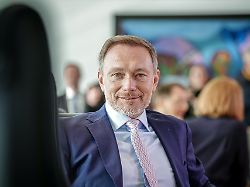Traffic light talk near Illner
Lindner announces a zero round of citizens’ benefits for 2025
By Marko Schlichting
January 26, 2024, 4:33 a.m
Listen to article
This audio version was artificially generated. More info | Send feedback
Dispute over the child tax allowance, over citizens’ money, over agricultural diesel: the federal government is in the polls. In the ZDF talk show Maybrit Illner, the guests talk about how that could change. However, Finance Minister Lindner does not want to discuss citizens’ money.
The program is almost over when Finance Minister Christian Lindner from the FDP arrives with bad news. In the evening he is a guest on the ZDF talk show Maybrit Illner, which this time is about what could be done about the citizens’ frustration with the politics of the traffic light coalition. In any case, argue less, says the Prime Minister of Mecklenburg-Western Pomerania, Manuela Schwesig.
But the next fight is probably coming soon. This is likely to be about citizens’ money again, which – according to Lindner – will not increase in the coming year. Citizens’ allowance was increased disproportionately this year because of the expected inflation rate. “The consequence, according to my expectations, will be that there will be a zero round of citizens’ money on January 1st, 2025,” says Lindner.
At the very end, the minister makes a suggestion to get farmers’ frustration under control. The government wants to stick to the expiry of the subsidy for agricultural diesel, but Lindner could imagine eliminating another rule. Since autumn 2022, farmers have not been allowed to cultivate four percent of their arable land. Lindner is in favor of overturning this regulation, Manuela Schwesig agrees with him. However, there is a small downer: both politicians do not mention that this is an implementation of an EU decision. The EU Commission, which decided on “set-aside” a year and a half ago, wanted to protect the environment and the climate.
“I care about the matter”
Manuela Schwesig understands the farmers who are now loudly taking their frustration with the federal government to the streets. “It’s about the issue for me, and as Prime Minister I represent the citizens of my country,” says the SPD politician. Mecklenburg-Western Pomerania is a rural federal state. And the government’s current austerity plans only affect rural areas. In addition to agricultural diesel, this includes the withdrawal of support for network fees, which would mean that wind farm operators would have higher electricity costs. Schwesig calls it “absurd.” The increase in the CO2 price will make gasoline more expensive, which will particularly affect commuters. Finally, there would be the “injustice with child benefit”. “I can’t explain that to any citizen.”
What Schwesig means is increasing the child allowance that high-earning people get. “We made a decision in 2022 that I am now implementing,” says Finance Minister Lindner, explaining this step. The child benefit was increased particularly significantly for the years 2023 and 2024 and at the same time it was decided to increase the child allowance for this year. This is a question of justice. Contrary to what is claimed, the current budget is not a budget for cuts. Lindner: “We’re not making savings, we’re changing the structure of the budget so that we can finance new tasks.” For example, the working middle class is supported by reducing income and electricity taxes. However, old subsidies also have to be dispensed with, which is why the subsidy for agricultural diesel must expire. Lindner continued: “We have a loss of economic prosperity because we pay more for imports, for example for energy. And the solution to this is that we have to have a stronger growing economy overall, and we have to become more competitive.”
“Giving up must be balanced”
Economist Veronika Grimm can understand the frustration among the population. Real wages have fallen in recent years, but energy costs have risen. “There is a lot of pressure in the country,” she says. Added to this is the change in the economy. Many companies will use software and artificial intelligence to accelerate processes, jobs will be eliminated, and employees will be deployed in completely new areas. “I believe that politics must take a more comprehensive approach so that people accept it. Because, as with climate protection, people are already prepared to forego something.” However, this waiver must be balanced.
IG Metall boss Christiane Benner sees it similarly. She adds: “I think people need confidence, they need an idea. And they need the feeling that the government that is now in charge knows how we can steer this country safely into the future.” There is a lot of uncertainty at the moment. “We are in an extremely critical phase at the moment. I maintain that in the next two years very decisive decisions will be made – or not. If they are set well, if we make investments in our future, which will then lead to us If we have affordable energy costs, then we really have the chance to become and remain a good lead market and to continue to be an export nation because we can do everything.” The trade unionist has another suggestion: “…that we ask those who earn very well to pay more specifically.” For example, one could forego an increase in the child allowance in favor of people with low incomes.
